
Perry's Saints
or
The Fighting Parson's Regiment
• Title
• Author
• Preface
• Chapter I
• Chapter II
• Chapter III
• Chapter IV
• Chapter V
• Chapter VI
• Chapter VII
• Chapter VIII
• Chapter IX
• Chapter X
• Chapter XI
• Chapter XII
• Chapter XIII
• Chapter XIV
• Chapter XV
• Chapter XVI
• Chapter XVII
• Chapter XVIII
• Chapter XIX
• Chapter XX
PERRY'S SAINTS.
CHAPTER IV.
At Fortress Monroe. General Viele's talk. Weary waiting. Off at last. Order of sailing. Storm. Horrors of the voyage. Vessels lost. Off Port Royal. Tatnall's Mosquito fleet. Bombardment of Hilton Head and Bay Poiut by navy. Surrender. Captain Drayton. Landing of troops. First camp on Confederate soil. Foraging. Negroes' account of bombardment. Inspection and review. The sutler. Thanksgiving.[November 1861]
AT Fortress Monroe we remained until the 29th, when, with a fleet of seventy vessels, transports, and men-of-war, we put to sea, and steered for our final destination. I must not forget to mention that, during our stay at this point, there was much talk of a landing; whether for an attack upon some place in the vicinity, or merely for practice in view of what was before us, we never knew, but it gave occasion to General Viele, who commanded our brigade, to call our officers together in the cabin of the steamer, to impress upon them the dangers of the undertaking. It was a bloody lesson, probably thought necessary in the case of simple vol-
FORTRESS MONROE.
unteers, the conclusion of which was that we need entertain no hopes save of a glorious departure to the shades beyond. However, as it is the immediate danger which impresses us most, it was not surprising that we took courage from our hopes, and there was no unusual despondency. on our part. Some of the more reckless even ventured to suggest a doubt of the general's information on the subject of our final disposal.
The passage to Port Royal, S. C., which proved our objective point, was a very trying one. The breeze, which at the time of our departure was blowing freshly. from the storm quarter, soon stiffened into a gale, such as is seldom encountered even on our dangerous coast, and which threatened the destruction of the fleet. The very admirable order in which we started, with the transports in three columns, covered and protected on either side by the gunboats, was soon broken up, and many of the smaller vessels, which were unfitted for sea service, soon found themselves separated from -the fleet, which became completely scattered and in the utmost danger. Some put back to Hamp- ton Roads; one, the Governor, went down, after being relieved for the most part of its crew and the marines who had charge of its freight, and several went ashore and were destroyed by the rebels. During the storm the sealed instructions which had been given to each captain for such an emergency, were opened, and when it abated, the vessels that had weathered the gale quickly gathered at the point designated in the orders.
The discomforts of that voyage, no one can realize who has not been similarly situated. The sea-sickness was trying, but was as nothing compared with the discomfort arising from the close confinement in the fetid atmosphere of the ship, with no means of relaxation and no way of escape. It was a terrible experience. Owing to the great numbers crowded into the vessel, bunks were built all around and ill the immediate vicinity of the boiler, and to these the men were very closely confined, until the effluvia from their reeking bodies --for, in the intense heat, all clothing was dispensed with -- added to the stench of the filthy vessel, and the irritating annoyance of the vermin with which

Map Of A Portion Of "Sea Islands," Showing "Port Royal."
the steamer was infested, made a fitting counterpart of pandemonium, in point of suffering. Some relief was gained by the transfer, at Hampton Roads, of two companies, with a portion of the freight, to the steamer Matanzas, and a small detail, under Lieutenant Dunbar, to the steamer Belvidere, but it was only slight.
Our grand old colonel, in the height of the storm, securing himself to the mast, spent many hours apparently enjoying the magnificent exhibition of power. Nothing disturbed his equanimity, and his watchful care of those committed to him was never remitted.
November 4 we arrived off Port Royal bar. Under the supervision of an officer of the Coast Survey, soundings were made, and buoys planted along the channel. That night a few vessels crossed the bar, and in the morning the whole squadron moved in, headed by the flagship Wabash. While the soundings were being made, the Confederate Mosquito fleet, under Commodore Tatnall, opened quite a spirited fire, but without effect. And as all the movements of the various vessels were plainly visible from the transports, which were well out of range of the guns, we enjoyed the advantage of witnessing the proceedings, without sharing either the responsibility or danger. On the 6th, the weather was unfavorable, and the attack on
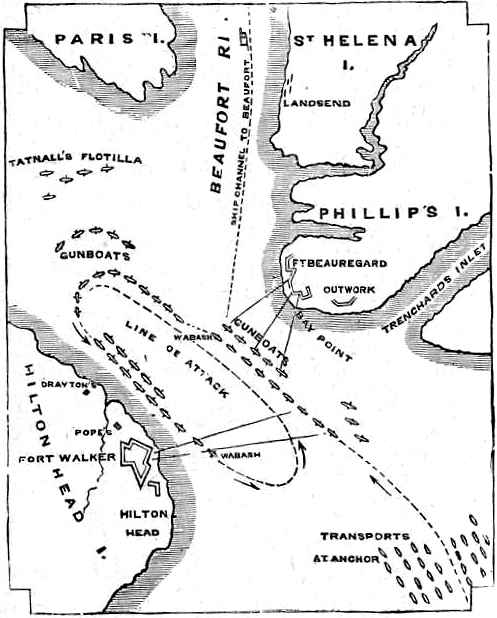
PLAN OF THE BATTLE AT PORT ROYAL HARBOR.
Forts Walker and Beauregard, which defended the harbor on either side, was deferred until the 7th. On that morning the gunboats moved farther in, headed by the Wabash, and the at- tack on the two forts commenced about 10 A.M. The more effectually to escape the fire of the forts, the gunboats moved continually in a circle, each delivering its broadside as it approached the forts. First, the Wabash poured in its heavy shot and shell upon Fort Beauregard, at Bay Point, as long as its guns bore upon it, and wearing round, opened on Fort Walker, at Hilton Head, while the gunboats, following in order, kept up the cannonade without cessation. This continued until between 2 and 3 o'clock P. M., when the forts surrendered.
Although anchored nearly five miles away, we could follow the direction of many of the shot and shell, especially the latter, and observe their effect. A little after noon, the Mercury, a small gunboat, got on the southerly side of Fort Walker, so near that its guns could not be sufficiently depressed to bear upon her, and from that point was able not only to shell the troops outside of the fort, who were held in reserve, but to throw in so effective an enfilading fire upon the fort itself that its guns could not be served. It was a stroke of impudence which seemed so ludicrous on account of the apparent insignificance of the little craft that the troops on the transports shouted themselves hoarse in admiration of this seeming act of bravado, which, however, proved aft important feature of the attack. As soon as the fire from Fort Walker ceased, and it was apparent that at least a part of its garrison, with the other forces on the island, was retreating, a flag of truce. was sent ashore to arrange the terms of surrender. But it was too late for any conference, as none but the dead and wounded remained, and the Stars and Stripes soon waved the announcement that the first step in the avenging of Fort Sumter had been consummated.
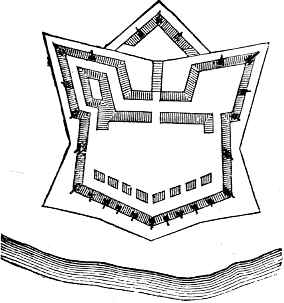
FORT WALKER.
Not a man in the command but felt the significance of that victory. Charleston was nearer now than it had been before, and, in the minds of many, it seemed but a little thing to cover the intervening distance with victorious troops. The flight of the Confederates was precipitate, and they left behind everything that would cumber a rapid retreat. Fort Beauregard had suffered less from the bombardment than Fort Walker, but the fall of the latter hastened its evacuation, and on the following morning no opposition was offered to its occupation by our forces.
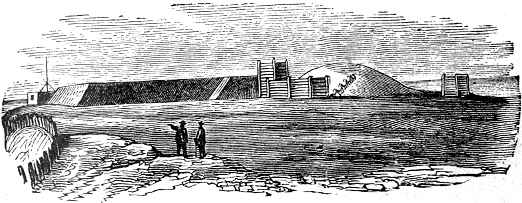
FORT BEAUREGARD.
One fact in this attack is worthy of special mention. General Drayton commanded the Confederate forces on Hilton Head, and the home of the family was located on a prominent point near the shore, overlooking the bay, while his brother, Captain Drayton, commanded the gunboat Pocahontas, which participated in the bombardment. Some time afterwards, in company with other officers, I visited the Monitor, which he then commanded, and his grave and saddened demeanor told of the sacrifice he had made in his loyalty to the government. I know that patriotism is a word with some considered stale and obsolete. Such know little of the temper of the brave men who composed our army and navy during that terrible struggle.
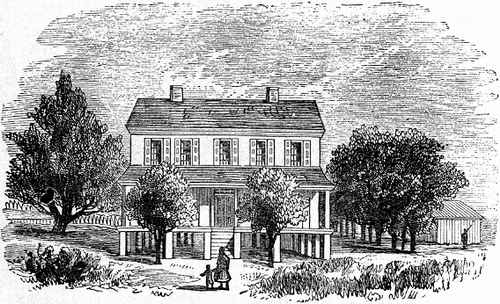
DRAYTON'S MANSION.
For while few were called upon to make such sacrifices as Captain Drayton, the number of those who went to war for hire only was but a small detachment of that great army. And the arguments, even of those unlettered men who formed so large a part of the rank and file, as I have often heard them stated, though clothed in rude and homely language, had in them a degree of intelligence, and were so charged with honesty and sincerity, so backed by courage and fidelity on many a gory field, that it were shame to say the stream of patriotism has run dry. It has not now, and never will, while men have manhood left, honor to defend, homes to protect, good laws and a righteous government to transmit.
November 9 we were all ready to land, having been provided with two days' cooked rations, but for lack of transportation we were detained on board the steamer until Sunday morning, the 10th. The night previous was spent in securing boats and attaching them to our steamer, so that on Sunday morning, as soon as the word was recei yed, we pulled for the shore with a will. At this time, the harbor presented a most animated appearance. The transports were crowded together near the shore, all busy in discharging freight. Boats of all sizes and descriptions were passing to and fro, and horses and other animals were being hoisted from the holds by means of broad bands which encircled them, swung over the sides of the vessels, and gently dumped,into the water, to find their way to land as they could, while men stood by ready to secure them on the shore. Occasionally the poor distracted brutes, confused by the unwonted sounds, and half drowned by their sudden and unexpected immersion, turned seaward, but were soon brought back.
It was a beautiful Sabbath morning, but with little to remind us of the sacred character of the
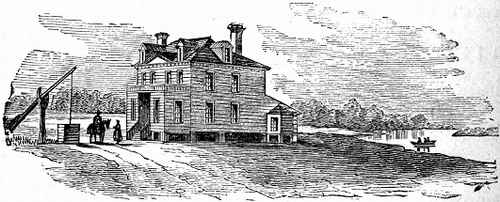
POPE'S HOUSE AT HILTON HEAD.
day. After landing, we marched a little way from the beach and remained until aout noon, when our camp was located, not far from general headquarters, and we proceetled to prepare the ground for our tents, and establish guards and pickets. Two nights wpre spent without shelter, on account of the difficulty and delay in landing baggage. After this we settled down to regular work. From ten to twelve each day we had battalion drill, in which the
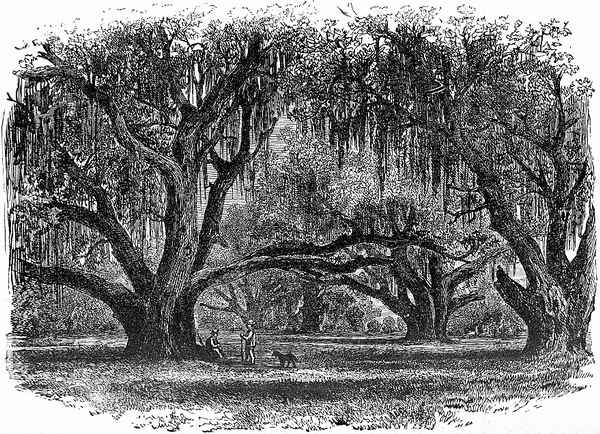
LIVE OAK GROVE AT PORT ROYAL.
colonel was very exacting, requiring the officers to know their duties, and holding them responsible for the condition and drill of their companies. Company drill was from two to four in the afternoon, and dress parade in the evening, often followed by more battalion drill. Details were made for fatigue duty in building entrenchments, an extensive line of earthworks was thrown up as a precautionary measure, and frequently nearly the whole regiment was picking, shovelling, or felling trees to furnish material for the works. There was no idle time, except when a day on picket or other guard duty secured the following as a day of rest.
Having been detailed as officer of the guard the first day in camp, the following day I was permitted by the colonel to accompany a small party bound on a tour of observation. During the day we wandered far away from camp, to the other side of the island, and the afternoon found us on the borders of a large plantation, which proved to be that of a Mr. Seabrook. Approaching the place, we mistook the whitewashed huts of the negroes for tents, and remained a long time in doubt whether to advance or retreat, feeling quite certain that it was a Confederate encampment that we saw. While debating what course to pursue, a stray contraband relieved our apprehensions by informing us that our troops occupied the place. We found on our arrival a detachment of the 45th Pennsylvania, posted there to keep watch for Confederates and prevent foraging. That night we spent in Mr. Seabrook's store, after using the portion of the afternoon that remained to us after our arrival in endeavors to secure some of the cattle, pigs, and poultry, which seemed to be wanting an owner, to which the guard, usually lenient on such points, raised few objections. These came mostly from the quadrupeds and bipeds themselves, and were so strenuous that the result of our efforts was a meagre show of two or three lean pigs, an occasional hen,and an ancient goose, which succumbed to my own personal prowess.
On our way back to camp, the next day, we narrowly escaped arrest, as General Viele had issued an order that all parties coming in from foraging should be deprived of what they had collected and sent to his headquarters un-
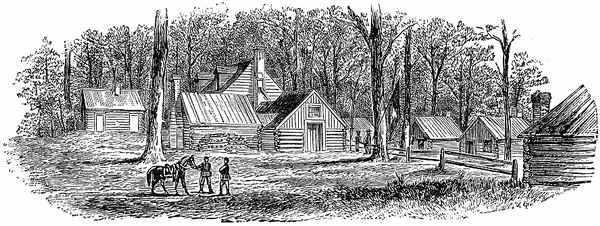
NEGRO QUARTERS.
der arrest. My poor goose suffered the fate of the pigs and hens, and no doubt rested heavily on the stomachs of the pickets, if not on their consciences. We were glad to escape with the loss of our plunder.
Supplies were abundant, the negroes bringing to camp whatever the plantations produced, and although General Viele issued an order that everything should be taken to his headquarters, where a general market would be held every morning, no attention was paid to it, and as far as we ever heard, no general market was established.
About a week after the capture of Hilton Head, I was detailed to take command of the Grand Guard, whose headquarters were at Drayton's plantation. The negroes had generally remained here, as well as at the other places within the range of our command, and were encouraged to cultivate the plantations abandoned by their masters. This was important, as the famous Sea Islands formed a part of the territory captured by our forces, and considerable of the cotton remained un picked, while nothing had been done towards the harvesting of corn, potatoes, and many other products of the soil. Some of the negroes here were owned by Captain Drayton, who had left them in the care of his brother, and no doubt some of the shot from his guns had fallen among his own people. The evidences of the cannonading were manifest all about, and the negroes, when. questioned as to its effects upon them, declared that at first they didn't mind the firing, but" when them rotten shot began to spatter about them, they jes' ran for de woods."
The regiment soon became proficient in drill, in spite of the frequent details for fatigue duty, and was regarded as one of the best, if not the very best, in the Department.
November 24 we had a general inspection and review, by Generals Sherman and Viele, in which the brigade marched first in quick, and then in double-quick time, around a circle of some two miles in extell t, according to the journal of Conklin, to which reference has before been made. We can all testlify that it seemed much longer, with the sand sometimes almost ankle-deep. General Viele perhaps thought us amply paid for the exertion, when he declared that we marched as well as regulars, and were equal to any regiment in the service.
Day followed day with about the same round of duties. We had already become fairly accustomed to tent life, our food supply was ample and good, and the paymaster furnished the means of providing ourselves with comforts and luxuries according to oqr several positions, or, rather, the amount of pay received. Besides the regimental sutler, who was prepared to furnish anything, from Golden Seal to toothpicks, for a consideration, shops of all kinds sprang up with amazing rapidity, as soon as it became known that this would be a permanent basis of operations, and usually only a short time elapsed after the visit of the paymaster, before his next appearance was looked for with eagerness, even by the sutler, who cultivated a disposition for extravagance, by giving credit to such as seemed likely to regard the obligation. Occasionally, when, too grasping, he became exorbitant in his prices, or in the rate of interest charged for accommodation loans - for too often the offices of banker and sutler were combined --a sudden raid would equalize the account.
At this time, measles and smallpox prevailed to some extent, and from the former several deaths occurred, while the latter was Hmited to a few cases by the isolation of those attacked.
Thanksgiving and Christmas passed with no observance on the part of the
non-commissioned officers and privates, except perhaps a more general
application to pick and spade. On Thanksgiving Day, the officers, many of whom
had been suitably remembered by friends at home, united their private stores
with such good things as could be collected in the vicinity, and indulged
themselves in unusual luxuries, forgetting for the time their surroundings, and
giving themselves up to the full enjoyment of the day, so far as their duties
permitted.